President’s speech: “Sweet Synergy”
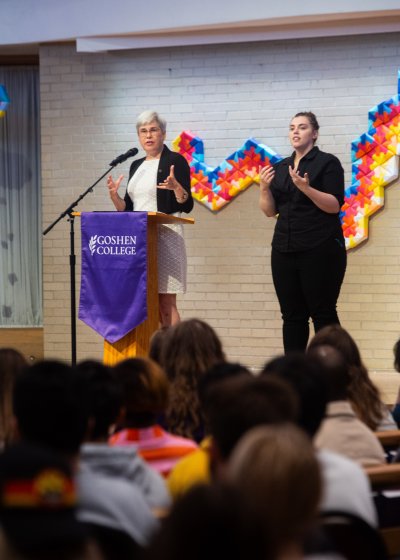
Opening convocation speech, as prepared for delivery by President Rebecca Stoltzfus, on Wednesday, Aug. 30, 2023.
Hello, Goshen College! Welcome to Fall 2023! It is fantastic to be here with each one of you. I am excited for what this year will bring.
Goshen College engages with our local community in a wide variety of ways. One of those ways is through our College Kindergarten. And I’m delighted that our college kindergartners are with us this morning. So representing all the many community members with whom we serve and learn, I ask our kindergarten children to stand.
And to the grown-ups in this gathering, if you attended our College Kindergarten, please stand. Children, you will always be welcome here and maybe someday you will be a Goshen College student too. Going to kindergarten is a big deal! We each remember our first day at school, and now some of us are in our 16th year of school. We are so excited for you, and we know that you have a lot to do this morning. Now is the time for you to return to your classroom through this aisle, and our grown-up students would like to give you a round of applause for being kindergartners this year.
I want to begin this morning with a few thoughts about ketchup. Ketchup is a fantastically delicious condiment. Have you ever wondered why? There are five known fundamental tastes in the human palate: salty, sweet, sour, bitter and umami. Umami, if you’ve never heard of it, is the savory protein-y taste of meat, soy sauce or mushrooms.
Well, ketchup delivers all five of these flavors. Ketchup, according to food scientists, has the critical dimension of “amplitude,” the word sensory experts use to name flavor synergy: flavors that are so well blended and balanced, they “bloom” in the mouth. Ketchup is salty, sweet, sour, bitter and umami in perfect synergy.
And you love it. Jeremy Corson, our chef, reports that we collectively consume about 10 gallons of ketchup per week on campus, or 150 gallons per semester. It beats ranch dressing by three to one.
Synergy is an interaction or cooperation between different things that gives rise to something greater than the simple sum of its parts. The term synergy comes from the Greek language, and it literally means working together.
But synergy is qualitatively different from two things or people doing the same thing side by side. Mathematically, that is additive. 1 + 1 = 2. Synergy is more than that, and it arises from differences working together. One plus a different one becomes greater than two.
Synergy is sweet. And synergy is all around us – in flavors, in music, on teams, in relationships and business and biology.
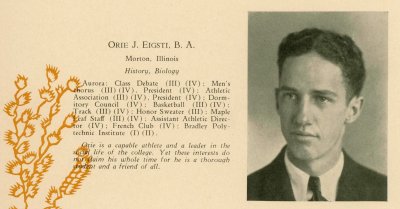
Let me tell you a story. Long ago, in 1929, Orie J Eigsti arrived at Goshen College. Orie was a farm boy from Illinois. He attended high school in the years of the great depression, and by his own account, his high school education was “poor, very poor.” In the middle of the 1920s, his high school had a total of four teachers. The only sciences they taught were math and physics.
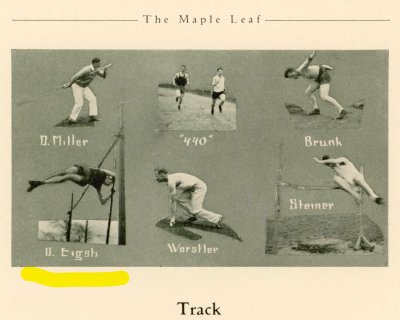
He came to Goshen on an athletic scholarship, in an era before Goshen had intercollegiate athletics. But intramural sports were a passion here then, as they are now. Orie participated in nearly every sport, but most of all, he could jump and run. In 1930, he held GC’s winning marks in pole vault, high jump, long jump, the 220-yard dash, and the 110-yard dash. Orie ran the 110-yard dash in 10.8 seconds.
Now, according to Justin DeWeese, our assistant athletic director of communications and operations, if any of you could run the 100-meter dash at that pace, it would break our school record today. So go for it! Beat Orie!
Our Eigsti track is named in honor of Orie J Eigsti.
Dr. S. A. Witmer, a biology professor and the namesake of our Witmer Woods by the college cabin, became Orie’s favorite teacher and inspiration. Orie took every course Dr. Witmer taught: botany, zoology, bacteriology, genetics. He took his first course in genetics and he fell in love with Gregor Mendel and his peas, how traits in peas could be followed from generation to generation. He would go back to the dorm and explain it to all of his friends.
Let’s pay attention to the synergy happening. First, Orie himself was not one thing, and neither are you. He was a farmer, a competitive athlete, a budding botanist with a mind for math.
Each person here is many things – it is the work of a lifetime to discover the many parts of ourselves and how they work together to best effect. You have synergies within you and around you waiting to be discovered.
And the way to discover synergy is to approach differences, variety, diversities within you and around you with curiosity and openness to the possibility that this different part of yourself, this other human being who seems so unlike you, this saltiness, the bitterness, the manifold magnificence of the world offers you something. Engaging difference with open curiosity is a super-power.
This morning we got to be with kindergartners! Children need grown-ups. They need our care and attention. Research also shows that when adults are with children, we are more generous and kind. Another example of synergy – across life stages. Children have a positive effect on us for many reasons. One of them is that the shortcomings that we perceive within ourselves often don’t matter to children. As one psychologist describes it, children offer us an unusual level of unconditional positive regard. And that is such a relief in a world that can feel very harsh and judgmental! What if we offered one another an usual level of unconditional positive regard?
Eboo Patel, a Muslim interfaith leader and friend of GC, recently wrote:
“In popular discourse, there’s a model of social change that seems to say that if I tell you how much I hate you and totally delegitimize you, then something better will rise up from the ground. That’s craziness.”
He goes on to say:
“Responsible civic institutions need to ensure that America’s religious traditions are not forfeited to the nefarious forces of prejudice, extremism, and division. Faith must be a bridge to deeper understanding and stronger social cohesion — not further polarization.”
This space in which we gather for chapels and convocations is a sanctuary – which means a place of refuge and protection. We share this building with a church, College Mennonite Church, or CMC, which has been a part of this college since 1903.
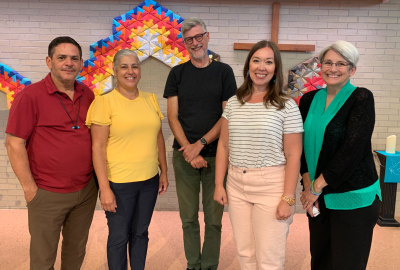
These people are the CMC pastoral team, and you might see them around. Their offices are in the corner of the building closest to the Newcomer Center. They welcome you to Sunday worship in this space, at 9:30 a.m. in English, or at 11:30 in Spanish.
Our relationship with CMC is synergistic – neither the church nor the college would enjoy this beautiful sanctuary, or the fellowship hall, or the College Kindergarten without this partnership. CMC is currently providing financial assistance to 19 of our international students. They are also assisting more than 20 refugee families who have relocated to our community.
Up there, on the balcony behind those screens, is a logistical staging area for household resources and clothing that are being moved out to people arriving in our community from other nations, often with no material possessions.
This sanctuary, shared by the college and the church, is a space that holds many cultures and perspectives.
Indeed, the capacity to consider something from multiple perspectives, to “think otherwise,” is an essential trait for innovation.
Perspective taking, or the ability to “think otherwise,” is also the basis of good decision-making, and it is why diverse teams outperform teams of similar people. Teams that share too much in common fall comfortably into group think – in which people reinforce a single perspective – and that actually feels really good in the moment. But groupthink leads to poor decisions.
In contrast, diverse teams use their capacity to think otherwise, asking questions like:
- “But is that true?
- What you see in this?
- Say more about that.”
Considering the perspective of another, especially someone outside your identity group, may seem counterintuitive and may feel uncomfortable, but the payoff can be huge. Good leaders make it a habit.
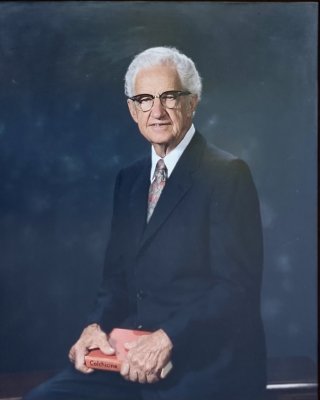
Back to Orie. After graduating from GC, Orie earned a Ph.D. in botany, and worked his way to the forefront of genetics at Cold Spring Harbor Laboratories where he worked next door to Barbara McClintock who won a Nobel Prize for her work on genetics in corn.
And then in 1948, Orie met a Japanese scientist, H. Kihara, at a dinner party of international plant breeders in Stockholm, Sweden – an unlikely encounter between leading scientists from the U.S. and Japan after the terrible events that divided our nations in World War II.
Kihara was working with watermelons, a plant that is especially prone to genetic changes – and which also produces an enormous and delicious fruit! His work caught Orie’s attention, and they decided to collaborate. A truly sweet synergy: between two scientists from across the world; blending science, farming and entreprenership. Building upon each others’ work, they finally achieved their aim: to reliably produce seed that would generate seedless watermelons that are crisp, sweet and crimson inside, that resist disease and are sturdy in transport.
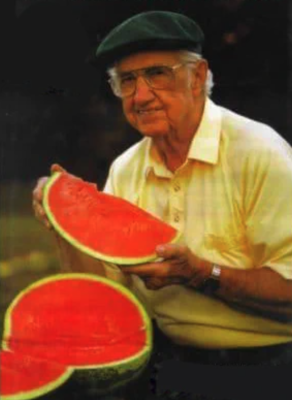
Thanks to a fellow Maple Leaf, we all enjoy seedless watermelons today. Seedless varieties now account for more than 90 percent of the watermelon market in the U.S. Orie sold his company in 1999. Lawyers made him sign a non-compete agreement to ensure that he would not come up with any new idea that would out-do the patents he had just sold. He laughed when he recounted this story; he was, after all 91.
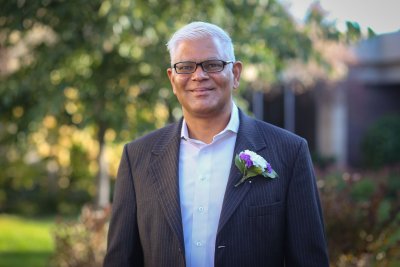
And now, we turn to another alum, Shashi Buluswar. Shashi came to Goshen College from Calcutta, India, and studied computer science and business.
With an MBA and a Ph.D. in artificial intelligence, Shashi now teaches at UC Berkeley, and works toward solutions for combating global poverty. In 2021 he established the Global Citizenship Award for GC students in their third year of study who represent our Core Values in exceptionally synergistic ways.
The five GC core values are:
- Servant leadership,
- Passionate learning,
- Compassionate peacemaking, and
- Global Citizenship –
- All of which arise from being Christ-centered.
Students were nominated for this award by faculty and wrote an application essay. This is a highly selective award, and I want to commend every student who was nominated.
I am thrilled this morning to announce the 2023 winners of the Global Citizenship Award, who are all seniors at GC this year and here this morning.
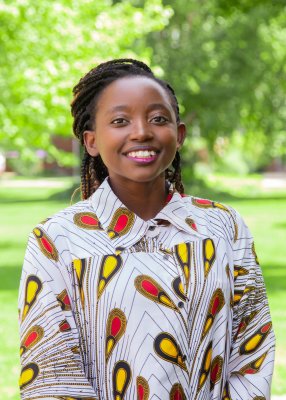
The first of two runners-up, who will receive a $5000 scholarship is Bongiwe Ncube. Bongiwe is a molecular biology major nominated by professor Neil Detweiler. In her essay, Bongiwe wrote about the synergy between reason and revelation. She wants to serve diverse communities as a physician, and wrote that it is imperative for her to have a holistic approach to human health, seeing the divine spark in every person. Last summer Bongiwe did research at Stanford University and presented her work at an American Heart Association conference last fall. Bongiwe is from Zimbabwe, a country that has experienced economic instability for decades and is no stranger to continuous currency depreciation. Bongiwe wrote “I have learned at GC that service is a non-depreciating currency.” Congratulations, Bongiwe!
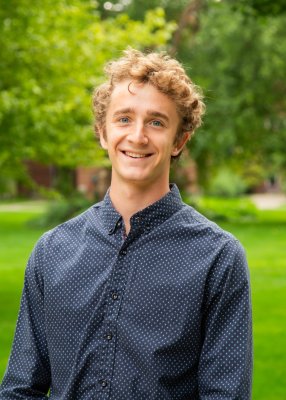
The second runner up, also receiving a $5000 scholarship, is Caleb Shenk! Caleb is an accounting major from Goshen, with minors in Spanish and Bible/Religion, nominated by faculty of the business department. We describe Goshen College as a place “where everything connects” and that is certainly true for Caleb. Caleb writes for The Record, competes on the men’s tennis team, sings in Vox Profundi choir, won the 2022 Crossword Scholarship and competed in GC’s C. Henry Smith Peace Oratorical Contest. Caleb wrote that leadership, for him, involves listening and being intentional about where he works, seeking out diverse opinions, working with fair-trade businesses, partnering with the church, and using his minor to work with Spanish-speaking people. Congratulations, Caleb!
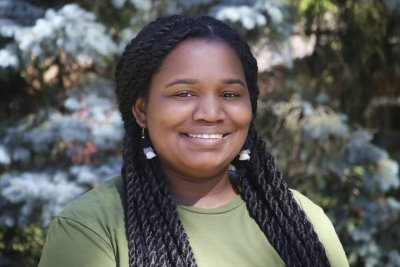
And the recipient of the $10,000 Global Citizenship scholarship is Jakyra Green, nominated by Duane Stoltzfus, professor of communication. Jakyra is an English and Education double major from Elkhart. Jakyra was co-editor of The Record last year with Mariela Esparza, and they used that forum to center voices and topics of diverse members of our community. Jakyra was awarded first place from the Indiana Collegiate Press Association for a feature news article, served as president of the Black Student Union, and was the winner of the C. Henry Smith Peace Oratorical Contest. Jakyra is grateful for GC’s SST programs, but she also understands that being a global citizen does not require traveling abroad. She wrote: “Limiting our circle to what’s “familiar” hinders our ability to grow and learn. We must ask ourselves, “How can I empathetically surround myself with those who are different?” Congratulations, Jakyra!
And to each and every one of you: Enjoy the manifold magnificence within you and between you. Be open, be curious, be flavorful. Use your superpowers to create sweet synergy.




